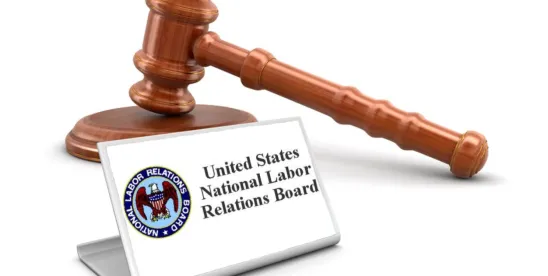Under the administrative scheme established by the National Labor Relations Act (NLRA)– the federal law that governs the relationship between employers, employees, and labor unions – the discretion whether to issue an administrative complaint against an employer based on an unfair labor practice charge is held by the National Labor Relations Board’s (NLRB or Board) General Counsel. The General Counsel therefore acts as the NLRB’s chief prosecutor. In that role, the General Counsel controls what issues are presented to the NLRB for decision (by deciding what issues are to be prosecuted), including those cases that may present novel issues or that provide vehicles through which to seek a change in existing federal labor law.
Jennifer Abruzzo was the NLRB’s General Counsel during the Biden Administration. During her tenure as General Counsel, she issued more than two dozen guidance memoranda (“GC Memos”) addressing a wide range of issues. Many of these GC Memos were controversial because they sought to stake out new positions in areas not previously regulated by the NLRA. For example, in 2021, Ms. Abruzzo expressed her position in a GC Memo that scholarship athletes at private universities are employees and therefore can organize and bargain collectively, as well as enjoy the protections of the NLRA. In 2023, she issued a GC Memo that set out her position – and therefore signaled her intent to prosecute in appropriate cases – that certain non-competition and employee training repayment agreements violate the NLRA. Other GC Memos issued by Ms. Abruzzo changed the NLRB’s approach to negotiating settlement agreements with parties charged with violating the NLRA, essentially requiring that any settlements provide full remedies, and consequently making the environment for obtaining pre-complaint settlements far more challenging.
President Trump removed Ms. Abruzzo shortly after inauguration. It has long been the practice of a new General Counsel to unwind many of the policies and positions expressed by predecessors in their GC Memos. It therefore was widely anticipated that a new General Counsel would do so, which is what happened on February 14, 2025.
On that date, through his own (and first) GC Memo, the current Acting NLRB General Counsel, William Cowen, rescinded 15 of Ms. Abruzzo’s GC Memos in full, as well as rescinded an additional 13 of her GC Memos “pending further guidance.” Among those GC Memos rescinded were the GC Memos discussed above addressing student athletes, non-competition and employee training repayment agreements, and requiring full remedies in settlement agreements. Other GC Memos now rescinded include Ms. Abruzzo’s GC Memo directing aggressive use of the NLRB’s ability to seek injunctions from federal courts, her GC Memo directing “vigorous enforcement” of NLRA through expanded arguments under the “mutual aid and protection” and “inherently concerted” doctrines, and her GC Memo addressing NLRA violations based on employer use of electronic monitoring and algorithmic management of employees.
Acting General Counsel Cowan’s action, although anticipated, included some interesting commentary. In rescinding nearly all of former General Counsel Abruzzo’s GC Memos, Mr. Cowan noted the extreme backlog of cases at the NLRB, impliedly attributing that to Ms. Abruzzo’s aggressive efforts to expand the reach of the NLRA and prosecute employers under her novel theories. Mr. Cowan remarked: “if we attempt to do everything, we risk accomplishing nothing,” certainly a suggestion that Ms. Abruzzo’s ambitious actions may have done more harm than good.
In the near term, the effect of the rescission of Ms. Abruzzo’s GC Memos signal that the NLRB will no longer seek to prosecute employers based on the theories expressed in them. It also portends that parties charged with unfair labor practices may be able to resolve charges earlier, and on more favorable terms, than was the case under Ms. Abruzzo’s watch. More changes will undoubtedly come once the NLRB has a quorum of Republican-appointed Members. As we discussed in our post shortly after President Trump removed both Ms. Abruzzo and former NLRB Member Gwynne Wilcox, the NLRB presently only has two Members, meaning that it cannot issue decisions in unfair labor practice or representation cases. So far, no new members have been nominated, so when the NLRB regains a quorum and can proceed to resume its function is unknown. However, when it does, it is anticipated that the NLRB’s General Counsel will seek to put in front of it cases that will provide vehicles by which in can reconsider some of the more controversial decisions issued by the Biden NLRB, including Stericycle, which changed the standard for evaluation of employer rules, and its blockbuster decision in Cemex Construction, which upended the process by which unions obtain the right to represent employees.




 />i
/>i
